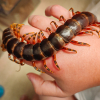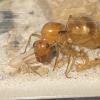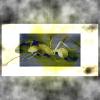I hear it happens in ant colonies but how often is it?
It's for my Camponotus CA02 colonies. Since I've gotten them late June, I don't think I've witnessed it before. Either it happens and I don't see it (sometimes during the late night) or I just have more larvae now and therefore see it more often or something more serious?
In the last month or so, for the first time, I noticed it 5 times. 1 of those times it was during the stage in which the larvae was spinning the cocoon but stopped for unknown reasons for several hours. The other times were pupae half way into their development, they look like ants but very white, I'm guessing about a week, maybe two into their development cycle, they didn't seem to react so they might be dead. The ants just start eating into the cocoon and then eating the pupa. Edit: The temperature is about the same too, 76 - 78.5 F, water tower near max, water on piece of paper towel in the outworld to drink. Pretty much the same setup for all these months. I have added a second outworld, but don't see that being the issue, mature ants seem perfectly fine.
The brood still seems to be developing normally, other than this issue.
Just wondering why now and so many. I don't recall changing anything in their diet, they have fat gasters, a lot of protein over other day (normal feeder insects I've always been feeding) and same thing for sugar water that I mix myself. I have up the humidity a bit for the last week or so, enough to see more condensation.
Journal in signature if you want to know more about the colony if that'll help with troubleshooting the issue.
Thanks beforehand.
Edited by BleepingBleepers, November 18 2023 - 5:02 PM.


















